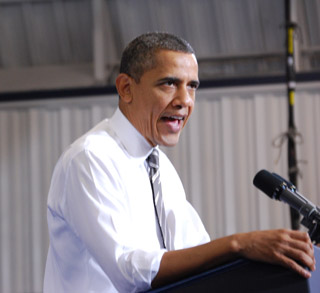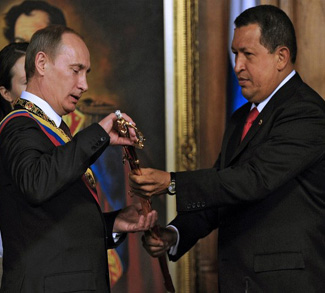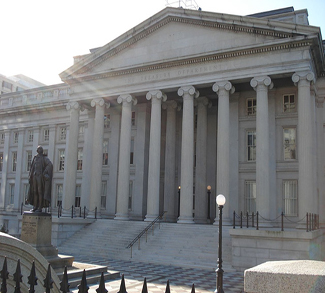FORECAST
Threats to American economic dominance and the USD continue to grow as oil producing regions talk about, and act on, abandoning USD denominated oil sales and currency pegs. Iran’s announced February 27 oil bourse launch could mark the end of the American empire as we have known it for the last 60 years.
American economic, military and cultural dominance is dependent on and funded by the world’s use of the USD as the foreign reserve currency. The world uses the USD as the primary foreign reserve currency because, up until recently, all sales of oil were closed in USD (see: American decline – January 7, 2008).
This practice ended in December 2007 when Iran stopped selling oil in USD. In the same month Russian oil firm Rosneft followed Gazprom and Lukoil in selling crude in Russian Rubles rather than USD, due in part to dollar depreciation.
American militarism, dollar decline and monetary hyper-expansion have left the country’s resources stretched thin. American rivals are bold knowing that the US military is bogged down in Iraq and Afghanistan and oil producing American allies are growing weary of taking economic hits as the US Federal Reserve continues to cut interest rates and fuel inflation.
Currency ‘pegging’ – the practice of fixing one currency’s exchange rate to that of another – was adopted by Gulf Cooperative Council (GCC) countries that pegged to the USD. At the time this made sense as it aligned their currencies with their USD denominated oil sales and set the stage for the planned GCC monetary and economic union. The significant decline of the USD has changed the economic calculus, however.
Kuwait was the first GCC country to end its peg in May 2007. It attributed the decision to the increased cost of imports due to the sliding dollar. It has since adopted a basket of currencies to back the now floating Dinar.
In January 2008 Qatar announced that it would follow suit and drop its peg over the next six months.
Numerous insider leaks and reports suggesting that Saudi Arabia and the UAE will break from the peg next are predictably followed by official announcements that no such action will be taken.
American promises of arms and significant investments both in the USD and the American economy make the larger GCC countries reluctant to take any action that will undermine the US economy.
A more subtle and likely course of action is for the countries to gradually reduce USD denominated foreign reserves and exposure to the US market. Though unlikely to cause the stir that a sudden break would, Saudi divestment is by no means a good thing for the US economy.
To make matters worse the Organization of Petroleum Exporting Countries (OPEC) announced on February 9 that it could switch to selling its oil in Euros instead of Dollars within the next 10 years.
What could truly mark the end of American economic and military dominance, however, is the Iranian oil bourse planned to open on February 27. Should the non-USD denominated commodities exchange open and operate successfully it would allow for the trade of oil and oil-backed derivatives in an alternative currency.
This would negate the necessity of holding large quantities of USD in foreign reserves. USD divestment would follow and the USD would tank. The US military cannot be funded at its current levels without expanding the money supply through the sale of suddenly worthless currency and bonds. The empire would crumble.
Iran has talked about opening its oil bourse before. On February 27 we will see if this time they act.
SUMMARY OF EVENTS: February 4 – February 11, 2008
NORTH AMERICA
United States
President Bush unveiled a $3.1 Trillion budget on Monday that supports sizable increases in military spending and protects tax cuts.
US rules of engagement permitted American military forces in Iraq to cross Iranian and Syrian borders in pursuit of terrorists, a published report said.
AP has reported that a secret block exists at Guantanimo Bay where hundreds of men have been secretly locked up for years by the United States.
More than 23,000 representatives of private industry are working quietly with the FBI and the Department of Homeland Security to share intelligence and prepare for a situation of martial law, a report by The Progressive has revealed.
SOUTH AMERICA
Venezuela
Russia and Venezuela are at the final stage of talks on a deal to sell three Kilo-Class Project 636 submarines to Venezuela’s Navy, which could be clinched in April.
ExxonMobil has won a court order freezing 12 billion dollars in worldwide assets of Venezuela’s state oil firm as part of its battle for compensation over Caracas’s nationalization of key oil fields.
WESTERN EUROPE
United Kingdom
Gordon Brown has told MPs that secret intelligence agencies, including MI5, will be able to veto the use of their phone taps as evidence in court.
EASTERN EUROPE
Russia
An international election monitoring organization said Thursday that it will not observe Russia’s presidential election next month because of the “severe restrictions” imposed by the Kremlin.
Russian Foreign Minister Sergei Lavrov Thursday blasted US plans for an anti-missile shield in Europe, using a Polish newspaper interview to accuse Washington of imperialism and seeking to encircle Russia.
Serbia / Kosovo
Kosovo will declare independence in February, a top official said in Pristina Monday, a day after Serbia completed its presidential election.
Ukraine
The World Trade Organization approved the accession terms of Ukraine on Tuesday, paving the way for the country’s full membership.
THE MIDDLE EAST
Gulf states including Saudi Arabia and the United Arab Emirates will have to revalue their currency pegs this year following the dollar’s decline and US interest- rate cuts, said Bear Stearns and Merrill Lynch.
Iran
The Iranian Company of Commodities Bourse has been tasked by the government to establish the long-awaited exchange on Kish Island.
A rocket fired into space by Iran earlier this week raises “suspicions” over Tehran’s claims to have no ambitions to build a nuclear weapon, a Russian foreign ministry official told domestic news agencies Wednesday.
Iraq
According to the Turkish Army its fighter planes have successfully hit about 70 Kurdish rebel positions targeted in an air strike in northern Iraq earlier this week.
United Arab Emirates
The United Arab Emirates is likely to revalue its currency against the flagging dollar in a bid to bring down inflation and meet criteria for a single Gulf currency, an industry report said on Monday.
An undersea cable carrying Internet traffic was cut off the Persian Gulf emirate of Dubai, officials said Friday. It was the third loss of a line carrying Internet and telephone traffic in three days. The status of Iranian internet and its planned oil bourse remained unclear.
Israel
Israel will continue using Indian carrier rockets to launch its military satellites into space despite objections from Iran, The Indian Express quoted an Israeli source as saying on Thursday.
SOUTH ASIA
Afghanistan
Britain planned to build a Taliban training camp for 2,000 fighters in Southern Afghanistan, as part of a top-secret deal to make them swap sides, intelligence sources in Kabul have revealed. The plans were discovered on a memory stick seized by Afghan secret police in December.
AFRICA
Chad
Rebel leaders in Chad are giving conflicting statements about a possible cease-fire, while Chad’s government is declaring victory after rebels failed to take the capital in last week’s fighting.
Kenya
An arms import deal between Kenya and China has raised eyebrows that the arsenal was being brought to arm illegal pro-government militias.



